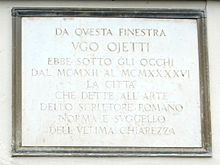Ugo Ojetti
Ugo Ojetti (* 15. July 1871 in Rome ; † 1. January 1946 in Florence ) was an Italian, strongly nationalistic acting art critic , journalist and writer . He drew a large part of his contributions with the pseudonym Il Conte Ottavio .
Life
The son of the architect Raffaello Ojetti turned to a career in political journalism after studying law and making early poetic attempts. After being posted to Egypt as a foreign correspondent for the nationalist magazine La Tribuna (1894), he worked for other widespread print journals such as Nuova Rassegna , Il Marzocco , Il Giornale di Roma , La Stampa or Il Giornale d'Italia . His articles and interviews increasingly focused on art criticism and since then he has maintained close contacts with various Italian intellectuals and artists such as Giosuè Carducci and Gabriele D'Annunzio . Ojetti was also responsible for some exhibitions as curator (e.g. Mostra del ritratto italiano dal 1500 al 1861 , Florence, Palazzo Vecchio , 1911; Mostra della pittura italiana del '600 e' 700 , ibid, Palazzo Pitti , 1922).
In 1905 Ojetti married Fernanda Gobba and settled in Florence , in 1914 he moved into permanent residence in Fiesole in the Villa Il Salviatino .
Shortly afterwards he volunteered for military service in the First World War . At the beginning of the war he was entrusted with the securing of works of art from the lagoon city of Venice, which was threatened by Austro-Hungarian air raids . In the following period he published lively articles and small letters with a strong patriotic and nationalistic character, especially after his appointment in March 1918 as commissioner for enemy propaganda. In the latter role, he also wrote some texts for the leaflets dropped by Gabriele D'Annunzio, among others, on the flight over Vienna in August 1918.
After the end of the war he founded several art magazines: Dedalo ( Milan , 1920–1933), Pegaso (Florence, 1929–1933) and Pan (Milan, 1933–1935). Despite their short-lived nature, all three journals are among the most important publication organs and historical evidence of Italian art during the interwar period . In addition, Ojetti continued to write for the daily press, and in 1926 and 1927 he also served as director of the Corriere della Sera . He was also responsible for several popular editions of major works of Italian prose , such as the I Classici Rizzoli series . In 1930 Ugo Ojetti was appointed a member of the Accademia d'Italia .
In 1925, Ojetti drew the Manifesto of the Fascist Intellectuals initiated by Giovanni Gentile and thus finally acknowledged Benito Mussolini , for whose course he had already shown strong public sympathy. The role of Ojetti in Fascist Italy , however, has so far hardly been dealt with by research or is largely ignored.
Ugo Ojetti left behind a daughter, Paola Ojetti (1908–1978) , who is known as a screenwriter and film critic .
Fonts (in selection)
Literary works
- Senza Dio (1894)
- Le vie del peccato (1902)
- Mio figlio ferroviere (1922)
Art history writings
- Ritratti d'artisti italiani (1911)
- I nani tra le column (1920)
- Raffaello e altre leggi (1921)
- La pittura italiana del Seicento e del Settecento (1924)
- La pittura italiana del Ottocento (1929)
Other fonts
- I monumenti italiani e la guerra (1917) ( digitized version )
- Lettere alla moglie 1915-1919 (1964 posthumously)
literature
- Giovanna De Lorenzi: Ugo Ojetti critico e collezionista d'arte. In: Da Fattori a Casorati. Viareggio 2010, pp. 17-29.
- Eckhard Leuschner: The nation and its art laws. Ugo Ojetti's 'Raffaello e altre leggi' (1921). In: Damian Dombrowski (Ed.): Art in search of the nation. Berlin 2013, pp. 250–264.
- Vittorio Martinelli: La guerra di d'Annunzio. Da poeta e dandy a eroe di guerra e "comandante". Gaspari, Udine 2001.
Web links
Individual evidence
- ^ Vittorio Martinelli: La guerra di d'Annunzio. Da poeta e dandy a eroe di guerra e “comandante”. Pp. 98, 265
| personal data | |
|---|---|
| SURNAME | Ojetti, Ugo |
| BRIEF DESCRIPTION | Italian art critic and writer |
| DATE OF BIRTH | July 15, 1871 |
| PLACE OF BIRTH | Rome |
| DATE OF DEATH | January 1, 1946 |
| Place of death | Florence |

